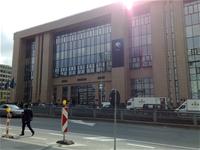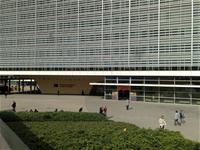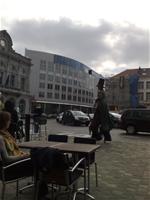Will the EU fill in the expectations of the world with the elections of a president and a foreign minister?
Adelina Marini, November 20, 2009
 This is the question the big global powers asked yesterday before the Eu leaders gathered in Brussels to continue the attempts to find the most appropriate candidates for the news posts, envisaged in the Lisbon Treaty, entering into force on the 1st of December. Those the permanent president of the European Council, now taking every 6 months by each member state and the foreign minister whose responsibilities might appear the bigger problem.
This is the question the big global powers asked yesterday before the Eu leaders gathered in Brussels to continue the attempts to find the most appropriate candidates for the news posts, envisaged in the Lisbon Treaty, entering into force on the 1st of December. Those the permanent president of the European Council, now taking every 6 months by each member state and the foreign minister whose responsibilities might appear the bigger problem.
On Wednesday after the EU-Russia summit in Stockholm the journalists asked not only the EU representatives but also the Russian president Dmitry Medvedev about the changes the Lisbon Treaty would introduce on the global chess-mate board, according to the expression of Zbigniew Brzezinski. And in spite a question was put for the president of the Commission Jose Manuel Barroso, the Russian president decided to comment on it, by saying with a strange kind of humour: "If I go back to the elections (for president and EU foreign minister), although this question was for Mr. Barroso, I would like to honestly say that I did not here the names of the high representatives, maybe because my partners do not know them yet".
In response to that the Swedish prime minister Fredrik Reinfeldt, who is good humoured but preferred to be more forthcoming said that one of the things that are being learned very early in politics was whenever a decision had to be taken, one should very well know who had the voting rights. Those with the voting rights are heads of state and government, he said and added:
"These are the people I'm talking to. I've now been talking full 4 working days and some nights with my colleagues because this is EU of 27. Just to make a phone call, I don't know if you've tried this but try to get in contact with 26 heads of state and government within 24 hours and good luck! These are people who tend to have some other things to attend to as well, aside of talking to me. But tonight I have one left, I have turned my second full round and as I've indicated they are not of the same opinion all of them. But I want to be clear on one point - it's foreseen that the Council president to be voted in with a qualified majority, the high representative also with a qualified majority, they must be accepted by Jose Manuel Barroso and also accepted by European Parliament. These are the conditions and they are also interlinked. Do we get these new figures tomorrow night? Well, I don't know. It might take a few hours, it might take all night - it has happened before in European history but that is what I am preparing and this is what I'm trying to present tomorrow".
The Russian president added to this that for Russia it did not matter who the president of the EU would be and who would lead the other European institutions if they continue to maintain the same friendly relations with Russia. Likewise, "it doesn't matter who is the president of Russia, but we understand what unified Europe means for us".
In spite of this statement of the Russian president, Russia and the US had very serious  expectations from the informal European Council in Brussels and it was not an accident that the media in those two countries had spent whole pages and topics on the issue who would lead Europe from the 1st of December. In a comment, entitled "When we talk about Europe, we mean Ukraine", the most popular Russian daily "Izvestia" writes that as the EU summit approaches, the more the chances for the conflict between Russia and Sweden (now presiding the Council) on the construction of the Nord Stream pipeline is to abate. The route of the pipeline is planned to trespass Swedish territorial waters.
expectations from the informal European Council in Brussels and it was not an accident that the media in those two countries had spent whole pages and topics on the issue who would lead Europe from the 1st of December. In a comment, entitled "When we talk about Europe, we mean Ukraine", the most popular Russian daily "Izvestia" writes that as the EU summit approaches, the more the chances for the conflict between Russia and Sweden (now presiding the Council) on the construction of the Nord Stream pipeline is to abate. The route of the pipeline is planned to trespass Swedish territorial waters.
Therefore, the authors of the comment Ekaterina Grigorieva and Ekaterina Zabrodina continue, the entering into force of the Lisbon Treaty will make the relations with the EU easier - the dependence on the positions of this or that country will fall away. Now every president of the EU presents his own priorities. Sweden, for example, although with good intentions, very much wants to discuss the fight with climate change. And in Moscow, aside from the signature of the Kyoto protocol and the commitments taken within the "big eight", there is nothing more to add.
The entering into force of the Lisbon Treaty, though bares some negatives for Russia: "In many of the negotiations and discussions with the EU it will be more complex because now they will speak in one voice", suggests Sergey Prihodko, adviser of president Medvedev, quoted by "Izvestia".
 The New York Times has also devoted a whole page to the issue, although it is rare for the American media to pay attention of European institutional problems. In an article, entitled "Europe Haggles Over Filling Presidential and Foreign Policy Posts ", the author Stephen Castle writes that the EU has spent eight years trying to modernize its rules and become a bigger global player. But now, facing a vote on Thursday to finally pick a slate of new and more powerful leaders, it is falling back on old-fashioned backroom deal-making.
The New York Times has also devoted a whole page to the issue, although it is rare for the American media to pay attention of European institutional problems. In an article, entitled "Europe Haggles Over Filling Presidential and Foreign Policy Posts ", the author Stephen Castle writes that the EU has spent eight years trying to modernize its rules and become a bigger global player. But now, facing a vote on Thursday to finally pick a slate of new and more powerful leaders, it is falling back on old-fashioned backroom deal-making.
The newspaper quotes analysts for whom the union’s obsession with striking political, geographical and ideological balances, coupled with the egos of national politicians who fear being overshadowed, has hamstrung the selection for new presidential and foreign policy posts. This would mean that the block may lower its sights from the original objective of the recently passed Lisbon Treaty: becoming a powerful force able to stand toe to toe with the US and China.
There can hardly be found a more eloquent position than that, expanded by the professor on International Affairs at the Georgetown University Charles Kupchan: "Seen from the outside Europe, with the changes in the Lisbon Treaty have the potential to be profound. The view from Washington is "bring it on". I cannot think of any time since the World War II when Democrats and Republicans alike have yearned for a Europe that can be more capable partner".
Whether the European leaders will be able to overcome the small interests and will fill in the expectations of the world, we will see. As the Bulgarian foreign minister Ms. Rumyana Zheleva said on Monday, the elections for the two new posts remind of the of conclave - the election of a pope in the Vatican. She added that the negotiations would be held as long as a compromise was reached. But the questions is whether such an elections would satisfy only Europe or it would be useful for the world as well, especially when we take into account the enormous wish of the EU to have a leading role on many global issues - the biggest of which the fight with climate change.
The names of the nominees for president of the EU: the Belgian prime minister Herman van Rompuy, the Luxembourg's Jean-Claude Juncker, the Dutch - Jan Peter Balkenende, the former Latvian president Vaira Vike-Freiberga, the former Finnish premier Paavo Lipponen and eventually the French prime minister Francois Fillon. Although the chances of the former British prime minster Tony Blair have drastically dropped, his name is also on the table.
The nominees for foreign minister: the former Italian prime minister Massimo D'Alema and the current first diplomat of Spain who has a rich international experience Miguel Angel Moratinos.